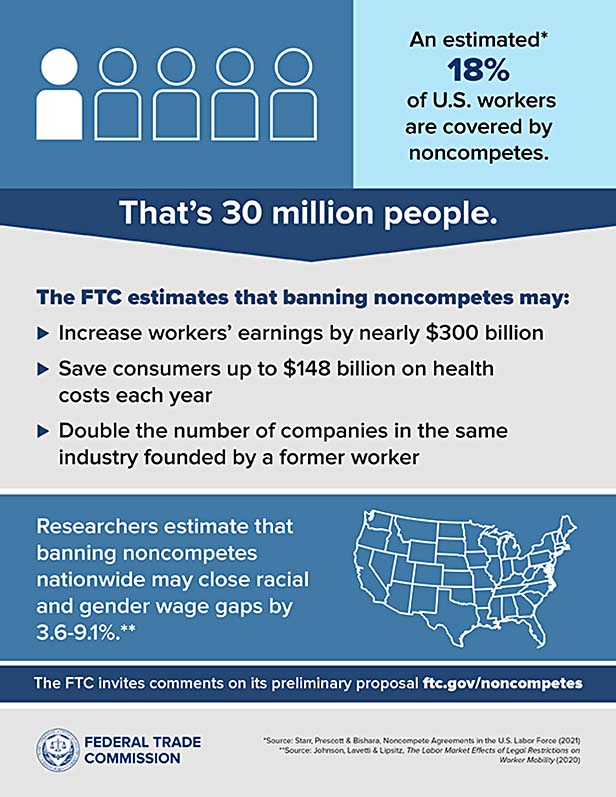March 02, 2023
Congressional Bill Would Ban Noncompete Clauses
The proposed legislation comes as the Federal Trade Commission has put forward a proposed rule that would also prohibit noncompetes.
The Federal Trade Commission has already proposed a rule that would ban noncompetes, stirring up a hornet’s nest of divided opinion in the promotional products industry and other sectors.
Now, separately, Congress is considering legislation that would also outlaw the clauses.
A bill that would in effect prohibit individuals and businesses from entering into, enforcing or attempting to enforce a noncompete clause has been introduced in the U.S. Senate and House of Representatives.
This quick-hit ASI Media video gives you the basics of proposed bans on noncompetes.
Democrats and Republicans have signed on as co-sponsors of the Workforce Mobility Act of 2023. The bill currently sits with committees in both chambers of Congress, awaiting further review.
“Noncompete agreements are blunt instruments that crudely protect employer interests and place a drag on national productivity by forcing covered workers to either idle for long periods of time or leave the industries in which the workers have honed their skills altogether,” the bill reads.
Similar bills were introduced in years that include 2019 and 2021, but stalled. This bill’s fate – whether it will make it out of committee for review for consideration by the full Senate and House – is yet to be determined.
An FTC-proposed ban on noncompetes is sharply dividing opinion in the #promoproducts industry. This special report has everything you need to know about the proposal and how industry pros are reacting to it.https://t.co/zU00xcMuWJ@ASI_MBell @Tim_Andrews_ASI @asicentral
— Chris Ruvo (@ChrisR_ASI) February 17, 2023
What Does the Act Do?
The proposed act essentially bars the use and enforcement of post-employment noncompetition agreements. It would give the FTC, the U.S. Department of Labor and state attorneys general the power to investigate and enforce the envisioned comprehensive ban on noncompetes. Individuals would be able to sue employers for violations, pursuing actual damages as well as attorney fees and costs.
Under the proposed law, employers would have to post notices about the noncompete ban in a conspicuous place on the workplace premises or “in a conspicuous place where notices to employees and applicants for employment are customarily posted physically or electronically.”
The legislation defines a noncompete as “an agreement … between a person and an individual performing work for the person, that restricts such individual from performing, after the working relationship between the person and individual terminates, any of the following: (A) [a]ny work for another person for a specified period of time; (B) [a]ny work in a specified geographical area; (C) [a]ny work for another person that is similar to such individual’s work for the person that is a party to such agreement.”
Proposed Exceptions & More
Notably, the act does not address the impact on non-solicitation clauses. It also does not preclude confidentiality agreements protecting trade secrets, saying nothing in the bill shall prevent “a person from entering into an agreement with an individual working for the person to not share any information (including after the individual is no longer working for the person) regarding the person, or the work performed by the individual for the person, that is a trade secret.”
The law carves out certain limited exceptions to the ban.
For instance, any partner of a partnership may enter into an agreement with any other member of the partnership that, upon the dissolution of the partnership or dissociation of the partner from such partnership, the partner will refrain from carrying on a like business within a specified geographic area, if any other member of the partnership, or any person deriving title to the partnership or the goodwill of the partnership from any other member of the partnership, carries on a like business in such specified geographic area.

Infographic courtesy of the FTC.
Also, if the sale of goodwill or ownership interests in a business occurs, the buyer may include a noncompete that compels the seller to refrain from carrying on/starting a similar competing business in a specified geographic area.
In another exception scenario, a buyer or seller of goodwill or ownership interests in a business could put in place a severance agreement with a senior executive that includes a noncompete. The agreements could only apply for up to one year and be within a specific geographic region. The agreement would have to provide monetary compensation to the senior executive in the event of termination at an amount not less than the compensation the executive would have been expected to receive during a one-year period following the sale.
The FTC Proposal Remains in Play
Separately from the Congressional bill, the FTC earlier this year proposed a rule that would prohibit employers from using noncompete clauses with all workers, including employees, interns, volunteers and independent contractors.
The rule could apply even to partnership and membership agreements among individuals.
Within 180 days of the rule taking effect, employers would have to rescind noncompete clauses with current and former workers. After rescinding, employers would have another 45 days to inform workers/former workers, through a specific communication to each, that the clause has been rescinded.
The FTC is accepting public comment on the proposed ban until March 20. Feedback could compel the FTC to alter what is proposed.
The earliest the FTC ban would take effect, if it ever does, is probably 2024. Legal challenges that could delay implementation are likely.